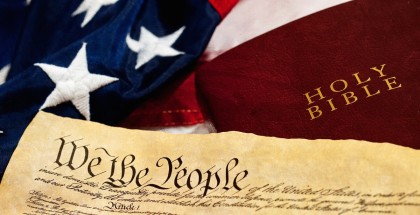Victoria Cobb, President | Family Foundation
When a citizen at a recent Suffolk Public School Board meeting attempted to conclude her public comments with a prayer, the Chairman of the Board, Tyron D. Riddick, interrupted her and said: “We can’t do that … no, ma’am … it’s not permitted at this time.”
Riddick further claimed that prayer is prohibited during the public comment period, and then asked the school board attorney to reinforce his claim, which the attorney did not do during the open meeting.
Then, when numerous citizens in the room responded by reciting the Lord’s Prayer (Matthew 6:5-15), Riddick moved the board into recess and ordered security officers to clear everyone out of the room simply for saying the Lord’s Prayer. But before the Board went into recess for five minutes, Riddick continued his chastisement of the citizens, saying that “a book that is very influential” (i.e., Bible) teaches decency and order, and that “conduct unbecoming will not be tolerated;” and “this is not a place to grandstand.”
Watch the entire exchange and the chairman’s comments HERE
Are we now at a place where, to our government officials, prayer is considered unbecoming conduct or grandstanding? Isn’t it hypocritical that the Chairman was actually grandstanding by using his position and his faith to disallow a citizen from concluding her remarks with a brief prayer? It is “do as I say, not as I do,” and its elitism at its worst.
After the recess, the Chair explained the reasoning of his prohibition on prayer: “…if we allow a Christian prayer to proceed, what do we do if a Satanist was to come in and say, “I want to pray as well”?” So, by his rational, no prayer is allowed since someone could pray in a way they may not like. Perhaps unbeknownst to the Chair, the government is not constitutionally permitted to show that kind of hostility towards religion or the free exercise thereof.
In last summer’s SCOTUS opinion in Kennedy v. Bremerton School District, the Court held that “The Free Exercise and Free Speech Clauses of the First Amendment protect an individual engaging in a personal religious observance from government reprisal; the Constitution neither mandates nor permits the government to suppress such religious expression.”
The Court in Kennedy also emphasized that: “Respect for religious expressions is indispensable to life in a free and diverse Republic. Here, a government entity sought to punish an individual for engaging in a personal religious observance, based on a mistaken view that it has a duty to suppress religious observances even as it allows comparable secular speech. The Constitution neither mandates nor tolerates that kind of discrimination.”
In listening to the chairman of the Suffolk School Board and the actions of the board, there is little doubt that they were suppressing the public prayer of a citizen and only allowing secular statements.
But as Richard John Neuhaus wrote in The Naked Public Square, “people do not and cannot bifurcate themselves so at one moment they are thinking religiously and at another secularly, so to speak.

